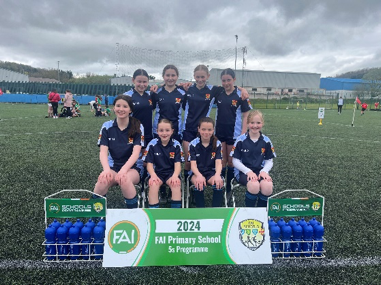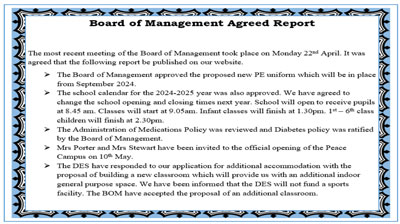In general homework is a mixture of oral work which will need an input from parents and written work which should be checked by parents. Ratified by Board of Management on Thursday 10th December 2020
AIMS
- To reinforce concepts taught in school.
- As an exercise in self-discipline.
- As a home-school link.
- Sometimes as preparation for the next day.
THE NATURE OF HOMEWORK
Homework is set for 4-5 nights per week. It is school policy that pupils who breach classroom rules and/or yard rules on three occasions per week will be requested to undertake homework on Friday night. Pressure to complete the syllabus in a subject at senior level may also dictate that a class is asked to complete homework on a weekend. The nature of the homework will vary between different classes.
In general homework is a mixture of oral work which will need an input from parents and written work which should be checked by parents. An activity using a digital platform (e.g. seesaw) may also be set for homework in any class.
Each homework may involve one or more of the following:
Reading and spelling
- In Junior Infants reading books are taken home. Pupils 'read' at home and/or practise key words with their family.
- Reading assignments from a Class Reader or Library Book are given from Senior Infants upwards.
- Both Junior and Senior Infants may be asked to do a little bit of writing or drawing based on the Phonics Programme.
- The majority of teachers from 1st class upwards use Spell Well Workbook (Primary Ed). The idea is that a unit of spelling and assignments based on their usage is completed in approximately one week. From time to time a teacher might experiment with an alternative series on an individual or small group basis. Spellings for Senior Infants may begin during the school year.
- Irish spellings and reading are regularly set from 2nd class upwards.
Written assignments
- Written assignments may include any of the following - English, History, Geography, Gaeilge, Health Education or Handwriting Practice.
- Both Junior and Senior Infants may be asked to complete a Literacy or Numeracy Assignment.
Mathematics
- Mathematics are regularly given. In all classes this usually involves consolidation and/or application of concepts already taught. Tables are regularly set for memorisation from 1st Class - 4th
Project Work
- This may involve research, collection of information for individual or group project.
Preparatory Work
From time to time preparatory work for a pending Art Class, science activity or other project may be set for homework.
RECOMMENDED TIMES
INFANTS : Up to 30 minutes
FIRST & SECOND : Average 30 to 40 minutes
THIRD & FOURTH : Average 45 minutes
FIFTH & SIXTH : Average 1 hour
CHILDREN EXPERIENCING DIFFICULTIES
Amount of homework set is at the discretion of the class or support teacher.
WEEKENDS
Up to third class: No written homework on Friday unless asked to do so as a discipline.
4th - 6th class: At the discretion of the Class Teacher
HOW DOES THE SCHOOL HELP PUPILS ORGANISE THEIR HOMEWORK
- At Infant level homework is written down for pupils by the teacher.
- Each pupil from 1st Class upwards is given a homework diary at the beginning of the year and asked to copy down homework from white board or interactive board.
- We try to ensure that our instructions concerning homework are clear to everyone in the class and are written down in the diary.
- We aim to mark or respond to homework in a way that is helpful to pupils. Availability of time is a problem at senior level and pupils at this stage should be aware that they learn for themselves and not for teacher.
HOW CAN PARENTS OR GUARDIAN HELP WITH HOMEWORK
- Check that homework details are filled in clearly and regularly in the homework diary. Parents need to check that all homework has been completed to the best of the child’s ability and then sign the Homework Diary.
- Help your child organise his/her time to best advantage so that things are not left to the last minute or forgotten.
- Try to ensure that there are suitable working conditions at home.
- Take a positive and active interest in your child's work at home rather than just insisting that it is done.
- Let us know if there are problems with homework which you cannot resolve. Contact the class teacher in the first instance who may be able to help.
FAILURE TO HAND IN HOMEWORK.
- We expect homework to be given in on time.
- Incomplete homework should be accompanied by a letter from parent or guardian.
- Pupils who repeatedly fail to hand in homework may be asked to complete the work at lunch time under teacher supervision.
PLEASE NOTE
- No homework is set for school holiday periods.
- Sick children are not requested by the school to undertake homework or missed school assignments.
- Parents who feel that their child is capable of doing additional work apart from set homework are encouraged to engage their child/children in additional worthwhile learning activities at home - reading, story writing, poetry writing, computation practice, practical activities involving weighing and measuring, revision of spellings, sentences based on spellings, listening to and discussing the News are some suggestions.
- Generally speaking, reading and spelling can be predicted and may be continued during absences.
- A homework schedule is not provided in advance to those pupils who absent themselves for the purpose of holidays during a term.
- For children who experience long term health problems and miss school regularly, the parent or teacher may request an appointment to discuss the issue.
N.B. It is necessary to adopt the above section as school policy to minimise disruption and to ensure and maintain the quality of teaching available to those in school.
Compiled: November 1995
Revised: March 2001/Amended November 2001
Reviewed April 2008
Reviewed and Amended: April 2013
Review and Amended: September 2017
Reviewed and Amended: December 2020
Ratified by Board of Management on Thursday 10th December 2020






